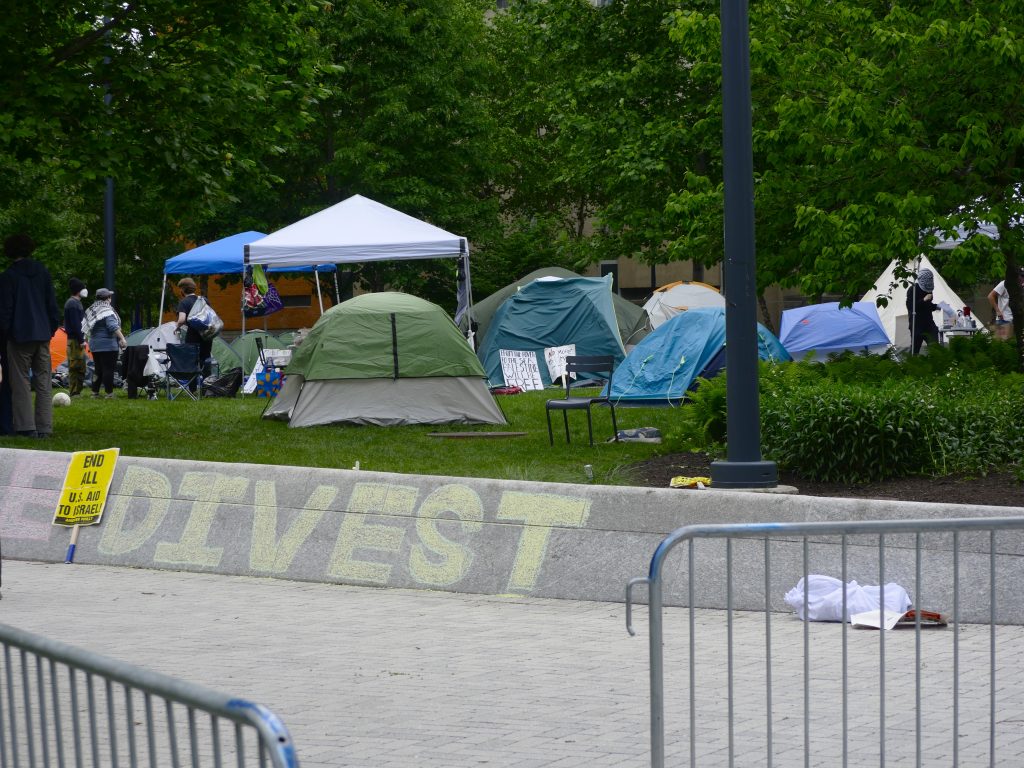
As with the announcement of the RA Union petition, I found myself reading another of The Triangle’s red banners on May 20. This one, however, housed a shocking, jaw-dropping alert — a Pro-Palestinian encampment had formed on the Korman Quad.
For those unaware, on the evening of May 18, the Korman Quad found itself unexpectedly occupied by a a Pro-Palestinian encampment consisting of approximately forty to sixty activists. Drexel University quickly placed its buildings and facilities under lockdown to minimize potential safety concerns for both protestors and Drexel community.
Two days later, President Fry sent out an email with an update regarding the encampment, stating Drexel University understands its duty to safeguard free speech and peaceful protests while also knowing when to exercise its right to depose of restrictive demonstrations that disrupt operations and pose a threat to its community. For the next several days, according to statements from President Fry, the encampment would continue to threaten Drexel’s Public Safety officers, subject random passersby to antisemitic and hateful rhetoric and openly target members of Drexel’s Jewish community.
It took six days for the encampment to disband. Organizers released a statement claiming they made a “strategic retreat” that “rejects symbolic arrest” along with talks that they will not “back down.” This was followed by a statement from President Fry on May 23, informing us of the encampment’s removal, along with his thoughts on the matter. Thoughts which appear to be completely absent in discourse from all universities experiencing these encampments, which in my opinion are illegal.
In his statement, President Fry states “…the University has the responsibility to all our stakeholders and the authority to regulate the time, place, and manner of campus protests.”
President Fry continued, “These demonstrations interfered with normal teaching and research activities, singled out members of our community for harassment and intimidation, and forced us to severely restrict access to the central part of Drexel’s campus. Moreover, abusive or discriminatory language, to which individual members of our community were subjected, is not protected speech.”
Where is the controversy? He made an informed response, took all necessary precautions, and had the encampment removed with “no altercations, no need to use police force, and no arrests.” A removal which was delayed as result of his unsuccessful communication attempts with participating Drexel students to remove themselves rather than risk being arrested.
Drexel may have shown its ability to stand up for itself, but what about other universities that have been plagued by similar encampments?
Swarthmore College, a prominent liberal arts college, shares a similar experience with Drexel. On April 23, in a letter released by the school, an encampment of student-led, Pro-Palestinian protestors made their presence known on Parrish Lawn. The school made it clear they plan on increasing the presence of Swarthmore Public Safety officers, but the school would find itself coated in antisemitic, hateful vandalism the following week. The school also encouraged students to “navigate their feelings” with trusted peers around these “issues.”
The most prominent difference between Drexel and Swarthmore’s response is that while the encampment at Swarthmore lasted for six weeks, Drexel took just six days to remove the Korman encampment.
Swarthmore released a letter on May 16, their most recent communication regarding the encampment, claiming that while they felt “progress was being made,” “we had reached an impasse.” Co-presidents Tomoko Sakomura and Rob Goldberg would go on to call for students to “voluntarily remove the encampment from Parrish Lawn.” Rather than call on Swarthmore Safety Officers to move in and dismantle the encampment, or even Swarthmore Police, it seems Swarthmore has low expectations for the safety of their students.
The co-presidents would go on to say that due to the encampment, the graduating class’s commencement would be moved to Philadelphia.
In another letter from May 20, the co-presidents addressed the community’s frustration towards the school’s unwillingness to have the encampment removed. They stated, “As we’ve seen at other institutions, attempts to clear encampments have often led to physical confrontations — including between police officers and protesters — and, in many cases, have not successfully ended the protests.”
Then, four days later, the encampment disbanded, making it the longest campus protest in the Philadelphia area. Swarthmore did not release any further letters regarding the encampment after May 20.
Swarthmore clearly does not care about its students. Grandstanding in front of their wealthy alumni and getting photos taken with their investors is far more important to them than standing up for its own students. Their passive approach, and willingness to lie regarding attempts by police to clear encampments, shows they are perfectly fine being made a mockery of by protestors.
I encourage anyone who was similarly enraged upon learning of the Korman encampment to rest easy knowing Drexel is led by those who care about you.


